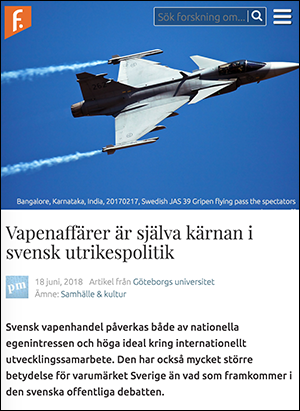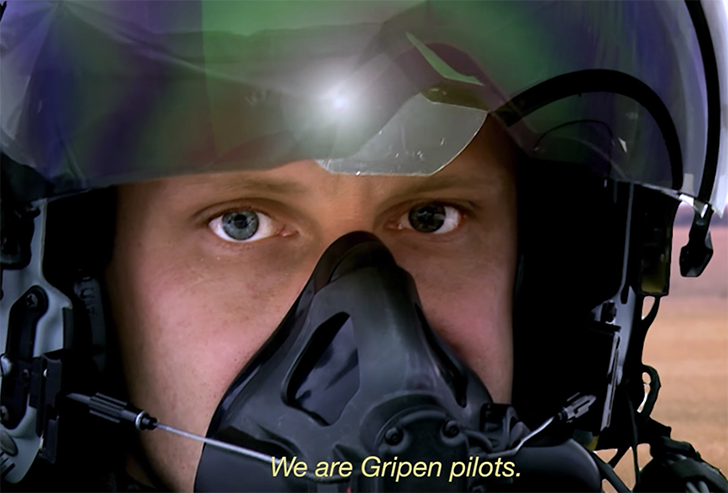
GRANSKNING. Göteborgs universitet skriver i artikeln: ”Vapenaffärer är själva kärnan i svensk utrikespolitik” att svensk idealism, mänskliga rättigheter, bilden av det neutrala Sverige och andra ”mjuka” faktorer är avgörande vid svensk vapenförsäljning.
Uppfattningarna baseras på en studie utförd av forskaren Wayne Stephen Coetzee som har utgångspunkt i Sydafrikaaffären 1999.
Eftersom bilden i artikeln av svensk vapenexport är odelat positiv och ber vi NewsVoice professionella läsare att försöka finna fem fel i denna bild av svensk vapenexport.
Text: NewsVoice | Publicist: Forskning.se med lokal hos Vetenskapsrådet publicerar resultat från offentligt finansierad forskning. Bakom sajten finns svenska lärosäten och en grupp forskningsaktörer.
Efter ett mångårigt stöd till anti-apartheidrörelsen kunde Sverige 1999 sluta avtal om försäljning av Jas Gripen till Sydafrika, enligt artikeln på Forskning.se.

”Sydafrikaaffären är ett exempel på hur svensk vapenindustri ändrade strategi efter kalla kriget. Intressena sammanföll med Sveriges förändrade utrikespolitik, med ett större fokus på globala Syd – länder i Latinamerika, Afrika och delar av Asien. Idag är export av flyg, ubåtar och liknande större vapensystem själva kärnan i såväl utrikespolitiken som varumärket Sverige i stort”, säger Wayne Stephen Coetzee.
Coetzee menar att Sverige lyckades med vapenaffären med Sydafrika pga ett tidigare stort stöd till ANC, för att Sverige uppfattats som en neutral aktör under det första kalla kriget, för att Sverige betraktades som en tung aktör inom internationellt utvecklingssamarbete och för att Sverige stod upp för de fattigas rättigheter.
Artikeln som är skriven () av (eller för) Göteborgs universitet uppger:
”Den här bilden är avgörande för hur Sverige lyckas med liknande affärer i andra delar av världen. Därför följer det också med så mycket mer än själva vapensystemet; ett helt paket av industriellt samarbete, stöd till fattigdomsbekämpning, myndighetsutveckling och liknande.”
”Inom en elit av industriledare och politiker finns det ett stöd för att vapenindustrin och vapenhandeln är bra för landet. Det har att göra med hur viktig vapenexporten är för svenskt näringsliv i stort och för varumärket Sverige.”
”Efter Sydafrika har Brasilien köpt JAS-Gripen. Nu siktar Sverige in sig på Indien och andra stora marknader i globala Syd”, säger Coetzee.
Wayne Stephen Coetzee drar slutsatsen att vapenindustrin har större betydelse för svenska handelsstrategiska satsningar ute i världen än för industrins betydelse för svensk militär säkerhet.
NewsVoice uppmanar dig som läsare att granska studien och den bild av svensk vapenexport som Göteborgs universitet förmedlar med sin artikel. Finns det fem fel eller är universitets och forskarens bild av Sverige som vapenexportör korrekt? Använd kommentarsfältet nedan eller skicka in en debattartikel.
Stödfrågor
- Finns det faktorer som är utelämnade i artikeln från Göteborgs universitet?
- Är och var Sverige neutralt under det första respektive det pågående kalla kriget?
- Vilka aktörer ”bestämmer” bilden av svensk vapenexport?
- Hur har ett svenskt stöd till fattigdomsbekämpning artat sig i Sydafrika?
- Hur stort var det svenska stödet till Sydafrika i jämförelse med kostnaden för det svenska vapensystemet, pengar som togs från Sydafrikas statskassa?
- Hur har Sverige stått upp för de fattigas rättigheter i Sydafrika? Har tex de fattiga fått tillbaka sin mark som vita kolonisatörer stal från landets ursprungsbefolkning? Markfrågan är en av de viktigaste aspekterna för många fattiga i Afrika.
Underlag
- Studien: Ideals and interests in Swedish foreign policy. Explaining the South Africa Gripen deal [se separat PDF]
- Forskning.se (artikel från Göteborgs universitet): ”Vapenaffärer är själva kärnan i svensk utrikespolitik”
Text: NewsVoice
En annan säljfilm för svensk vapenexport

 NewsVoice är en nättidning för oberoende nyheter, debatt och analys.
NewsVoice är en nättidning för oberoende nyheter, debatt och analys. 

